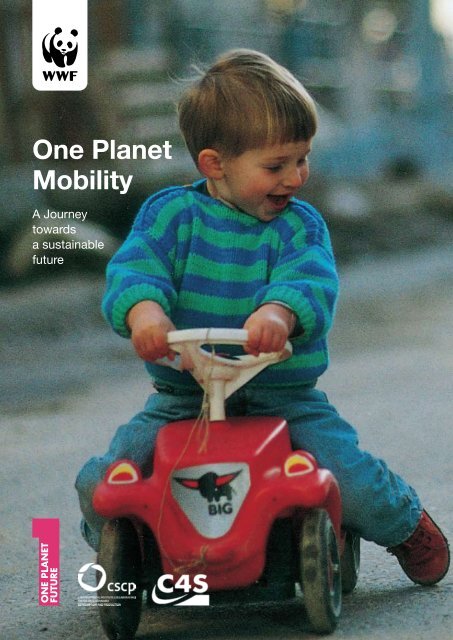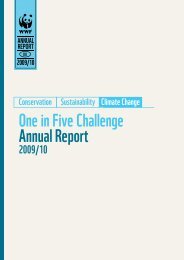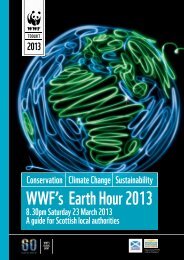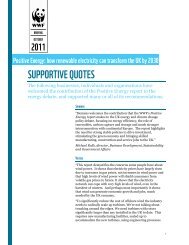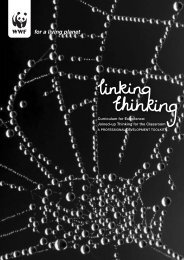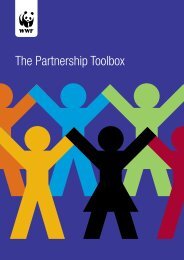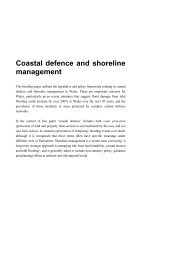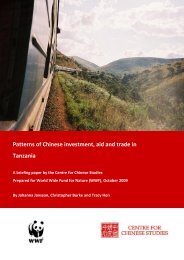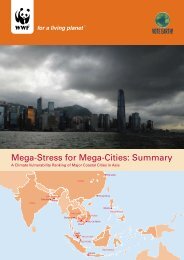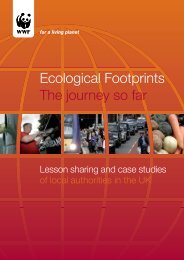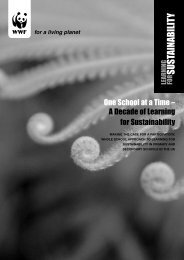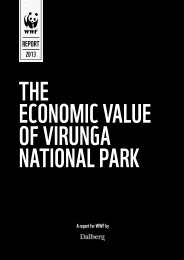One Planet Mobility - WWF UK
One Planet Mobility - WWF UK
One Planet Mobility - WWF UK
You also want an ePaper? Increase the reach of your titles
YUMPU automatically turns print PDFs into web optimized ePapers that Google loves.
<strong>One</strong> <strong>Planet</strong><br />
<strong>Mobility</strong><br />
A Journey<br />
towards<br />
a sustainable<br />
future
Executive Summary<br />
Travel has become an indispensable aspect of our lives. Our<br />
level of personal mobility was unheard of just 50 years ago,<br />
and it has shaped the way in which we build our communities,<br />
where and how we work, and how we spend our leisure time.<br />
In Europe, people today travel more often and over longer<br />
distances than in the past – whether commuting between<br />
home to work or school, to shop or for holidays.<br />
But the freedom of personal mobility has brought it onto a collision course with the finite limits<br />
of our planet. On a global scale, personal mobility is now responsible for 26% of carbon dioxide<br />
(CO 2<br />
) emissions. In Europe, mobility has the fastest growing energy demands of all sectors and is<br />
the only sector with consistently increasing emissions in most countries.<br />
Alongside the environmental impacts, some of the benefits borne out of the mobility revolution<br />
have not always brought higher levels of wellbeing. The average commuter in the <strong>UK</strong>, for<br />
example, now spends 29 working days each year travelling to work, equating to more than five<br />
years over a working life. Local air pollution and increasing noise levels impact poorly on physical<br />
and mental health and the costs of maintaining one’s mobility, from the price of filling up with<br />
petrol to the high infrastructure costs – all have a significant economic impact.<br />
Set against the growing consensus that most European countries will have to reduce their carbon<br />
emissions by 80% and possibly more by 2050, it is clear that the challenge faced by the mobility<br />
sector is enormous and will require radically different solutions to “business as usual”.<br />
So far, these solutions have focused on incremental steps, such as efficiency improvements to<br />
vehicles. While this has been successful in relative terms, overall these efficiency gains have been<br />
outstripped by the growth in demand for mobility. Fully embracing the challenge, however, presents<br />
us with a unique opportunity to realise a new system of mobility in the 21st century – from achieving<br />
low carbon travel to improving human wellbeing within the context of a one planet future.<br />
Transformational change is needed, but we need to overcome the barriers to such change. To<br />
help overcome these barriers, <strong>WWF</strong> created <strong>One</strong> <strong>Planet</strong> <strong>Mobility</strong> – a multi-stakeholder forum<br />
of key decision-makers and change agents from the personal mobility sector. Its task was to<br />
catalyse and inspire change within planetary limits.<br />
During 2007 and early 2008, more than 30 European organisations from business, government<br />
and civil society came together in the first phase of <strong>One</strong> <strong>Planet</strong> <strong>Mobility</strong>. This was a unique<br />
process aimed at developing a deeper understanding of the barriers and leverage points for<br />
sustainable personal mobility. Most important, it set the framework for creating collaborative<br />
solutions across different stakeholders to work towards systemic change.<br />
Over a series of six meetings, the following outcomes emerged.
1. Identification of the barriers to systemic change.<br />
A common understanding of the current barriers to systemic change was established in the early<br />
stages of the work. Some key barriers identified in the project were:<br />
• mobility prices should reflect their true cost, so that ecological and social costs are fully<br />
internalised;<br />
• we need to invest in the development of long-term solutions and find ways to bypass our<br />
current political fixation on short-term outcomes;<br />
• consumers need the right price incentives and market options to enable them to choose lowcarbon<br />
options – on everything from how they travel to working closer to home.<br />
2. Development of a series of pilot and research projects<br />
Participants in <strong>One</strong> <strong>Planet</strong> <strong>Mobility</strong> collaborated in order to innovate sustainable solutions to<br />
overcome some of the barriers to change. For instance, a small coalition of partners are exploring<br />
collaboration on accelerating vehicle efficiency and the market breakthrough of disruptive<br />
technologies such as electric cars.<br />
Other stakeholders are engaged in projects that are developing new business models intended<br />
to reduce the need to travel. This includes videoconferencing and setting up shopping facilities<br />
closer to people’s homes.<br />
3. Development of an alliance to address structural changes and market frameworks.<br />
To facilitate this sustainable innovation, the creation of an alliance has been identified as a<br />
means for further collaboration outside the confines of what can be achieved within a market<br />
context. The proposed alliance has the potential to use the collective influence of stakeholder<br />
organisations to advocate changes to market frameworks – changes that are necessary to<br />
overcome the barriers to sustainable mobility, such as specific policies or price incentives.<br />
<strong>Mobility</strong>, systems change and the <strong>One</strong> <strong>Planet</strong> Future<br />
The work undertaken by <strong>One</strong> <strong>Planet</strong> <strong>Mobility</strong> is the first step in a longer journey aimed at<br />
intervening in a system to ultimately deliver transformational change. Through the <strong>One</strong> <strong>Planet</strong><br />
<strong>Mobility</strong> process, participants have gained new insights into how systems change can occur and<br />
they will be building on this process within the mobility sector. The projects and alliances that<br />
emerged can be seen across three levels that range from short to long-term outcomes.<br />
• Ready to go: These are actions that stakeholders agree can be realised in the short term.<br />
For our <strong>Mobility</strong> work, this includes developing an agreed framework to compare emissions<br />
from different modes of transport.<br />
• Experimenting with alternatives: Stakeholders only roughly agree on the changes<br />
required. Experimentation and pilot projects are needed to test new ideas which could disrupt<br />
the system in the medium term. Examples have included a pilot project on the electrification<br />
of cars in a city context, and creating exclusive lanes for coaches on motorways.<br />
• Questioning paradigms: Long-term systems change requires that we question mainstream<br />
beliefs and paradigms through informed deliberation. This could include thinking about the<br />
possibility of creating societal change, and business models that enhance quality of life while<br />
involving less and possibly slower travel.
<strong>One</strong> <strong>Planet</strong> <strong>Mobility</strong> clearly demonstrated that meaningful dialogues are critical to<br />
overcoming the differences in our assumptions and beliefs about the world’s most<br />
pressing sustainability problems and to create meaningful actions to address them.<br />
We have started a journey to systemic change.<br />
We invite other leading organisations to join us.
The following organisations were among more than 30 organisations that participated in the<br />
<strong>One</strong> <strong>Planet</strong> <strong>Mobility</strong> project:<br />
The views expressed in this report do not necessarily represent those of individual<br />
participating organisations.<br />
Process design and facilitation:<br />
The mission of <strong>WWF</strong> is to stop the degradation of the planet’s natural environment and to build a<br />
future in which humans can live in harmony with nature, by:<br />
• conserving the world’s biological diversity<br />
• ensuring that the use of renewable natural resources is sustainable<br />
• reducing pollution and wasteful consumption<br />
<strong>WWF</strong>-<strong>UK</strong>, registered charity number 1081247 and registered in Scotland number SC039593.<br />
A company limited by guarantee number 4016725 © 1986 Panda symbol and<br />
® “<strong>WWF</strong>” Registered Trademark of <strong>WWF</strong>-World Wide Fund For Nature (formerly World Wildlife Fund)<br />
Printed on recycled paper. August 2008<br />
<strong>WWF</strong>-<strong>UK</strong><br />
Panda House, Weyside Park<br />
Godalming, Surrey GU7 1XR<br />
Telephone: 01483 426444<br />
Fax: 01483 426409<br />
Website: www.wwf.org.uk


